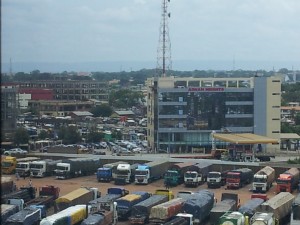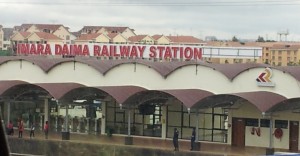When I wrote about intra-Africa business travel a few weeks ago, Charles Ivenco – one of my friends from Lagos Business School – left a comment in which he told us about the improvements in air transportation over the last decade, and how this is related to the increased levels of intra-African trade.
According to data from the African Union Commission, transport costs are 63% higher in African countries than the average in developed countries. The data are from 2012 but it doesn’t look like there’s been a dramatic change over the last two years.

And averages are averages. While there’s a clear need to improve transport infrastructure across the continent, there are some pockets of well-integrated transportation systems (as a reminder, this blog focuses on Sub-Saharan and Southern Africa):
- Economic Community of West African Countries (ECOWAS): this has a relatively well-linked road network through the Trans-West African Highway system, and the most integrated maritime transport (with seven ports for three landlocked countries). Also, there’s a plan to connect national railway lines;
- East African Community (EAC): this has the most integrated inland waterways system, which links Kenya, Uganda, and Tanzania (the largest of five member countries) through Lake Victoria;
- Economic Community of Central African States (ECCAS): five of its 10 member countries are serviced through the Congo River – this is the second most integrated inland waterways system;
- Southern Africa Development Community (SADC): this offers the most integrated air transport through South Africa.

During colonial times, the Western countries did a good job of connecting the coasts of Africa to Europe but they did not establish intra-Africa connections. Making up for the lost years will require substantial investment efforts. Careful planning to ensure the most efficient way to connect the various regions is also needed, taking into account both Africa’s geography and the departure point of each region. For instance, there’s potential to physically integrate the railway system across some regions: EAC, SADC, and UMA (Union du Maghreb arabe or Arab Maghreb Union) use a uniform gauge, and their railway networks are the ones with greatest integration potential.
Anyone experienced with intra-African goods transportation?


Hi Africa, At HP we have channel partners who distribute from RSA to Southern Africa and others who distribute from Kenya or Tanzania to Uganda.
However we as HP don’t act as importer of record in one country with the purpose to deliver into another African country.
In general there is a big problem in doing the import process at one country and then move goods in transit into another country.
This process is costly and cumbersome so we prefer to deliver directly to the final country of destination.
The intra-African trade and transportation could develop substantially if new transit regimes across countries would be developed;
this is line of the creation of customs union agreements between countries.
Cheers,
Joan
Hi Joan, thank you for highlighting this important aspect of the regional economic integration. Interestingly, the other day I talked to some managers of a trading company that operates in several African countries and they mentioned that the core of their business lies at the Import department — something I would have never anticipated!